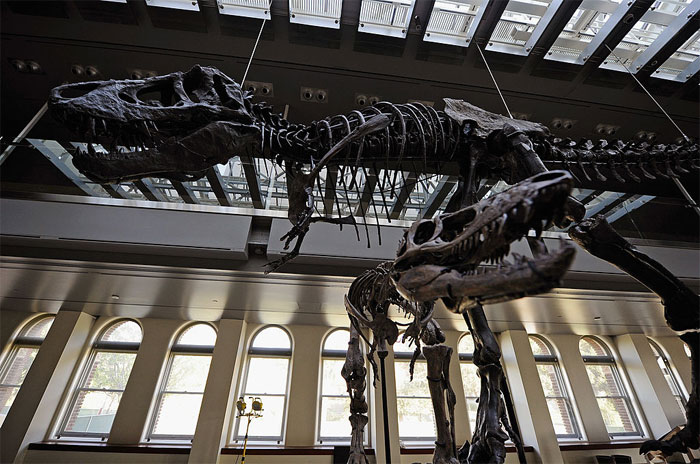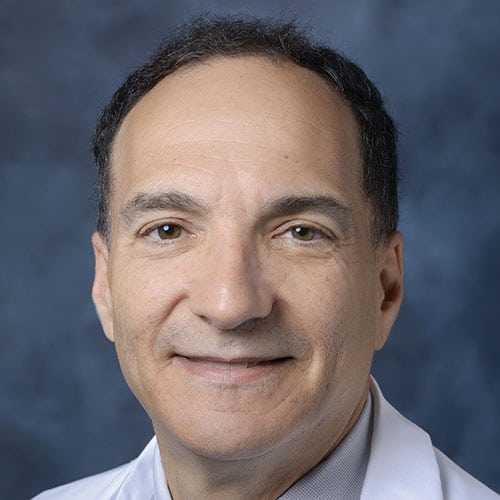 Kevork Djansezian / Staff
Kevork Djansezian / Staff Yom Kippur offers escape from daily rhythms and a chance to glean meaning that might otherwise go unnoticed along life’s busy wayside. The light of daily life burns so brightly that it veils the wonders of existence. The scale of the problem explains the challenging imperative to forego food and other distractions to allow the emergence of more subtle realities.
The Los Angeles Museum of Natural History might not seem like the ideal place to start a Yom Kippur journey toward meaning, but it worked for me this year. A couple of weeks ago, I accompanied my nature-loving daughter and wife to the Museum’s Spider Pavilion. After an hour gazing in amazement at eight-legged wonders, the ladies headed to the gift store and I to my long-time favorite: the dinosaur exhibit. I took a selfie beneath the imposing jaws of “Tommy,” a T-Rex that lived in Wyoming about 65 million years ago. The most remarkable aspect was not its size or apparently fierce bearing but the striking similarity to the human anatomy I studied in medical school. The rib cage and spinal bones look roughly like our own. It doesn’t take much imagination to see ourselves as a variation on a theme. Given the similarities, most of the evolution of this form must have occurred much earlier. Indeed, a quick reference to evolutionary biologist Richard Dawkins’ “The Ancestor’s Tale” reveals 1.2 billion years as the estimated point of divergence between vertebrates, like the T-Rex and us, and the non-vertebrates. Our individual lifespan represents the merest fraction of a blink of terrestrial time.
Rabbis seldom discuss these creatures, given that there are no Talmudic or biblical sources. It seems only likely that if our God created us, he created them as well. Scientists now believe they perished in a cataclysmic asteroid strike around the time of the T-Rex. This was their Noah’s flood and the birds are thought to be their only survivors. Our time will come too, both as individuals and as a species, but hopefully not in such violence. Unlike our ancient fellow vertebrates, whether we pass in fire or ice will likely relate to our own behaviors.
Many years ago, I discussed our responsibility with a rabbi, a smoker, who was my patient. A highly motivated foe of smoking, I decided to try a religious approach. Can you imagine, I asked, if one were given a Porsche (there were no Teslas) as a gift? And further imagine that if you drove it often, but never took it to a mechanic for an oil change or to have the tires checked. Wouldn’t that absence of due diligence reflect a failure to appreciate the value of the gift? So, if life is seen as the gift that is dropped off, keys and all, on the driveway, doesn’t smoking show disrespect to the Almighty? The rabbi nodded but never, to my knowledge, abandoned his habit.
Our challenge on Yom Kippur and beyond is to avoid understanding the lessons but failing to act on that understanding.
Our challenge on Yom Kippur and beyond is to avoid understanding the lessons but failing to act on that understanding. If the High Holy Days are to be a time for reckoning and for appreciation of our supernatural gifts, we should not neglect consideration of our earthly home, as Temple Isaiah’s Rabbi Dara Frimmer noted at her Rosh Hashanah sermon.
I’ve never understood why some who place religion at the front and center of American life often fail to prioritize conservation and environmentalism. If our lives are a gift from God, and if the earth is a God-given home, protecting and preserving it represents the minimal act of respect.
The occupants of the Natural History Museum left us no words. If they could, they might ratify those left by 15th-century Italian artist Masaccio. Below a fresco of a skeleton in Santa Maria Novella he wrote eerily in rhyme: “I was once just as you, you shall be as I am, too.” Mindful of our fate, what must we do? We should take these brief remaining moments to share ourselves with our friends and families, to demonstrate and teach kindness and to strive to preserve our earthly home for our species and for those who follow.
Daniel Stone is Regional Medical Director of Cedars-Sinai Valley Network and a practicing internist and geriatrician with Cedars Sinai Medical Group. The views expressed in this column do not necessarily reflect those of Cedars-Sinai.























 More news and opinions than at a Shabbat dinner, right in your inbox.
More news and opinions than at a Shabbat dinner, right in your inbox.